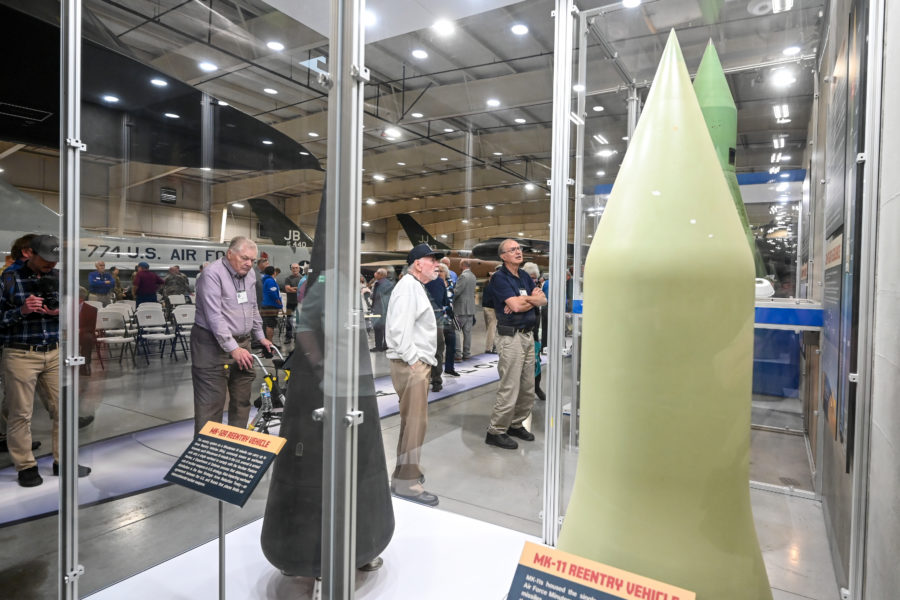One out of every three Americans is extremely concerned about the possibility of a nuclear war within the next five years, as worries about Russia and the security situation in Europe have surged, according to the results of a new survey.
The Ronald Reagan Presidential Foundation and Institute’s annual National Defense Survey, released Dec. 1, shows an American public increasingly aware of and nervous about the threats posed by near-peer competitors such as China and Russia—particularly in light of Russia’s invasion of Ukraine.
Out of 2,538 U.S. adults surveyed in mid-November, 69 percent said they were extremely or somewhat concerned about the possibility of a nuclear war in the next five years. That marks the highest percentage recorded since the survey began in 2018, and is eight points higher than last year alone—the largest year-over-year increase of any concern asked about.
That increase was largely driven by more people saying they were extremely concerned about it, up from 26 percent a year ago to 33 percent now.
Russia’s invasion of Ukraine is likely responsible for the new waves of concern about the issue, as Russian President Vladimir Putin has engaged in nuclear saber-rattling for months now. Starting in February, he put Russia’s nuclear forces on high alert. And ever since, he has left open the possibility of using nuclear weapons on the battlefield, while Russian officials have tried to muddy the waters by claiming Ukraine may use a radioactive “dirty bomb”—a move some U.S. and Western observers have warned could be a pretext for Russia using its own nuclear weapons.
In April, Congress’ nuclear adviser went so far as to wonder whether Russia could be looking to spark World War 3 with its actions.
Perhaps unsurprisingly, then, the percentage of survey respondents who said they were extremely or somewhat concerned about a nuclear attack by Russia on the U.S. rose from 60 percent a year ago to 71 percent now. Regarding the potential use of a nuclear weapon in Ukraine, the level of concern rose to 77 percent.
Beyond the threat of nuclear attack, though, the invasion of Ukraine has seemingly led more Americans to view Russia as an adversary.
Since the survey began in 2018, the percentage of respondents who identified Russia as the greatest threat to the U.S. declined every year, reaching a low of just 14 percent in 2021. This year, that trend sharply reversed with a surge to 31 percent, the highest figure recorded in five years.
Along those same lines, the percentage of those who identified Russia as somewhat or strongly an enemy of the U.S. jumped from 65 percent a year ago to 82 percent now.
China
But while concerns about Russia have increased, Americans have not forgotten about the ongoing competition with China—identified as the key challenge facing the U.S. in the recent National Defense Strategy.
China is still the top answer among survey respondents when asked to identify the greatest threat to the U.S., at 43 percent. And a plurality still believe the military should focus its forces in the Indo-Pacific region, specifically East Asia.
Indeed, 70 percent of survey respondents said they were extremely or somewhat worried about the invasion of Ukraine “distracting policymakers from the threat posed by China,” a finding highlighted by officials from the Reagan Institute in a press briefing.
The same percentage said they were concerned about China invading Taiwan, the first time that question has been asked in the survey’s history.
A plurality of respondents even said they would support committing U.S. ground troops to the defense of Taiwan in the event of a Chinese invasion—43 percent compared to 36 percent opposed. The survey then went even further in testing potential support in the case of an invasion.
“The pollsters have encouraged us to explore something quite common in polling, which is you sort of give people a piece of information and see if it changes their view,” said Rachel Hoff, policy director at the Reagan Institute. “And so after hearing a couple of sentences … about Taiwan being a democracy and being the world’s largest producer of semiconductors and testing whether that changes their view with regard to Taiwan, 65 percent then say that they’re open to the idea of committing U.S. forces in the case of a Taiwan contingency.”
Spending and Trust
As concerns about potential aggression by both Russia and China grow, the vast majority of survey respondents favor increasing defense spending—76 percent. And of that 76 percent, 48 percent said they strongly held that view. That represents a slight increase from years past.
The support for more spending has been reflected in Congress as of late, as lawmakers have moved to increase the top line of the Pentagon’s budget beyond what President Joe Biden’s administration has requested.
But even as support for more spending remains high, the question of trust in the military remains a contentious one.
Last year’s Reagan survey found a sharp decline among those who said they had “a great deal of trust and confidence” in the military as an institution, going from 70 percent in 2018 to 45 percent in 2021. Experts attributed that largely to increasing political polarization and the fallout from the turbulent withdrawal from Afghanistan.
This year, the survey showed a slight bump in those with a great deal of trust, up to 48 percent. And while it is still less than a majority, no other institution about which respondents were asked—including Congress, the Supreme Court, the news media, the presidency, law enforcement, and election administrators—registered more than 33 percent. All but Congress posted year-over-year declines in trust as well.
The biggest reasons for declining trust in the military cited by respondents was the perception of military leadership becoming overly politicized and the performance and competence of the Presidents as the Commander-in-Chief.
